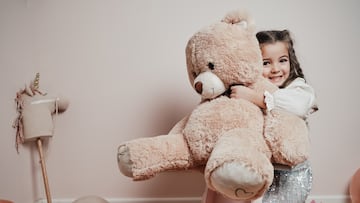Emily Goodcare from the University of Cambridge issues warning to parents about AI powered teddy bears
If you are thinking about giving your child an AI-powered teddy bears for Christmas, think again. Academics warn of the dangers.

As the festive season approaches, many new parents will be looking for a Christmas gift for their young children. Among the goodies on offer this year is a broad selection of AI-powered toys, including teddy bears, that run on OpenAI’s GPT-4o.
These AI teddies might appear cute on the surface but experts say that are not only inappropriate for young children, but also potentially dangerous.
In their imaginary universe, many young kids love talking to their teddies while playing - now, new developments in technology allows their toy friends to chat back to them.
How AI toys interact with children
Children can pick a theme that they want their AI bear to create, and the characters in the story - for example, a ghost, an alien, a cowboy... etc. However, when put to the test, you never really know what the toy is going to say to your children. Occasionally, it can blurt out something that is inappropriate at best, and dangerous at worst.
Emily Goodacre, a researcher with the Centre for Research on Play in Education, Development and Learning at the University of Cambridge, has led a study into AI-powered toys and how they can affect a child’s long-term development.
“These toys might be providing some kind of social interaction, but it’s not human social interaction,” Goodacre explained in an interview with Yahoo. “The toys agree with them, so kids don’t have to negotiate things.” Over time, she believes that can cause the child to form an unhealthy dependency with an inanimate object which it is unable to distinguish from a human.
Then there are the privacy concerns. These toys are listening all the time, recording every sound they pick up around them. They compile data including audio recordings to transcriptions of a child’s conversations with the AI.
All this private data is sent to Open AI’s servers where it is collected and stored - but what is it is being used for? As Goodacre points out: “How do we explain to a child that their teddy bear is recording them and sending that data to an unknown company, and also sending the conversations to their parent’s phone?”
It raises questions about personal privacy during children’s formative years, which could affect their development in negative ways. They might grow up thinking it’s perfectly normal that their parents somehow know everything they have said - even when they’re not in the same room as them.
AI toys giving dangerous replies
And last but not least, there is the danger that AI chatbots can give dangerous responses. There have been instances where supposedly kid-friendly AI toys have told young children where to find knives, medication or how to start a fire using matches. There have also been some instances of AI toys responding with sexual explicit content which is deeply worrying.
So if you are looking to brighten your children’s day this Christmas, be aware that AI-powered toys could be harmful to them - and maybe it would be a better idea to stick to a more traditional, non-taking teddy.
Related stories
Get your game on! Whether you’re into NFL touchdowns, NBA buzzer-beaters, world-class soccer goals, or MLB home runs, our app has it all.
Dive into live coverage, expert insights, breaking news, exclusive videos, and more – plus, stay updated on the latest in current affairs and entertainment. Download now for all-access coverage, right at your fingertips – anytime, anywhere.
Complete your personal details to comment